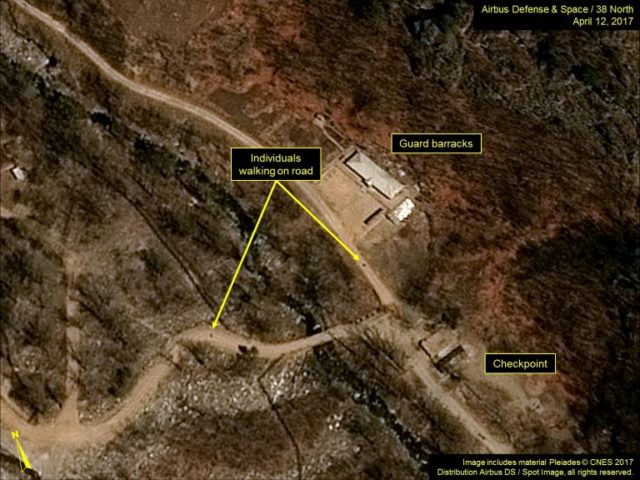Even as journalists trudge toward North Korea’s much-touted decommissioning of the nuclear weapons test site at Punggye-ri, nuclear weapons experts are worried the regime is using the media event to bank unearned international credibility while it destroys evidence of its illicit weapons research.
The arrival of foreign reporters involves a literal trudge, as they must undertake a 20-hour journey described by the South China Morning Post:
The journalists set off from the North Korean city of Wonsan, according to tweets from journalists within the group who added they were unlikely to have any internet or mobile phone coverage until they return to the city.
The journalists were put in sleeping cars on the train, four bunks to a compartment. The compartments had windows covered with blinds, and the journalists were told not to open the blinds throughout the journey.
Media were also expected to pay their own costs for the trip. The train fare was US$75 per person round trip. Each meal was US$20.
They are expected to travel for some 20 hours by train, bus and finally a short hike to the remote test site – a vivid illustration of the impoverished country’s notoriously decrepit transport infrastructure.
Considering the time needed to travel to the nuclear site from Wonsan, where North Korea has set up a press center for the foreign journalists, the demolition, if it happens, is likely to take place after Thursday.
After some initial reluctance, North Korea on Wednesday approved a list of South Korean reporters to undertake the pilgrimage to Punggye-ri. South Korea’s Unification Ministry said the team of eight reporters would be flown to Wonsan with a government transport plane. The last-minute approval provided some relief from concerns that North Korea is changing its mind about denuclearization and preparing to cancel the June 12 summit in Singapore between Kim Jong-un and President Donald Trump.
The screening process for invited guests of the Punggye-ri shutdown blocked anyone with nuclear weapons expertise, a suspicious requirement that led some experts to believe North Korea is asking for applause while it frantically destroys evidence of its illegal activities.
“It’s kind of like a murder scene where they let people like you and me trample around in it, it’s the same concept. The North Koreans have conducted all these tests here, every single weapons test, so if they let experts in to look at these tunnels before they let anyone else in that would be potentially for us an intelligence boon,” Angelo State University professor of political science Bruce Bechtol told CNN.
“Isotope measurements could tell you about the design of the device, it would tell you what kind of bombs they’re making, what they’re making them out of, how much uranium and plutonium is in the bombs. We might be able to infer what they’re planning and the shape of their progress,” explained Cheryl Rofer, a chemist with extensive nuclear cleanup experience.
Students of the Iran nuclear deal will be familiar with the challenge of monitoring compliance with a denuclearization program when the starting point is not clearly known. Critics of the deal complained that Iran concealed too much of the historical data needed to establish a compliance baseline. If North Korea sanitizes Punggye-ri and makes underground evidence completely inaccessible, a similar problem will develop.
There are also the urgent questions of precisely how badly damaged the primary testing tunnels at Punggye-ri became, and whether the facility could be reactivated in the future after North Korea reaps the benefits of “denuclearizing.”
It is important to establish the value of what Kim Jong-un offers to give up during negotiations. The UK Guardian pointed out Monday that without expert analysis of the test site, the shutdown of Punggye-ri could be a theatrical performance, a purely symbolic gesture of no real cost to the regime. Furthermore, the Guardian accused North Korea of using the journalistic dog-and-pony show as an opportunity to promote Wonsan, the city reporters are passing through, as a tourist destination.
The South China Morning Post on Tuesday added suspicions that North Korea is assembling all these journalists for a propaganda event, noting that Pyongyang was “sharpening its words” towards South Korea and the U.S. just as reporters were flying into Wonsan.

COMMENTS
Please let us know if you're having issues with commenting.